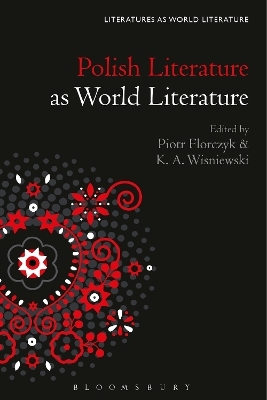
Polish Literature as World Literature
Bloomsbury Academic USA (Verlag)
978-1-5013-8714-2 (ISBN)
The volume features views of Polish literature and culture within theories of world literature and literary systems, with a particular attention paid to the resurgence of the idea of the physical book as a cultural artifact. This perspective is especially important since so much of today’s global literary output stems from Anglophone perceptions of what constitutes literary quality and tastes. The collection also sheds light on specific issues pertaining to Poland, such as the idea of Polishness, and global phenomena, including social and economic advancement as well as ecological degradation. Some of the authors discussed, like the Romantic poet Adam Mickiewicz or the 1980 Nobel laureate Czeslaw Milosz, were renowned far beyond the borders of their country, while others, like the contemporary travel writer and novelist Andrzej Stasiuk, embrace regionalism, seeing as they do in their immediate surroundings a synecdoche of the world at large. Nevertheless, the picture of Polish literature and Polish authors that emerges from these articles is that of a diverse, cosmopolitan cohort engaged in a mutually rewarding relationship with what the late French critic Pascale Casanova has called “the world republic of letters.”
Piotr Florczyk is Assistant Professor of Global Literary Studies at the University of Washington, USA, and an award-winning poet and translator. K. A. Wisniewski is Director of Book History and Digital Initiatives at the American Antiquarian Society, USA, and the Founding Editor of the open access journal Textshop Experiments.
Acknowledgments
Introduction
Piotr Florczyk, University of Southern California, USA, and K. A. Wisniewski, American Antiquarian Society, USA
1. Polish Neurosis and the World Literature
Michal Pawel Markowski, University of Illinois at Chicago, USA
2. Jan Potocki, the Greatest Author of the Polish Enlightenment as a French Writer
Emiliano Ranocchi, Urbino University, Italy
3. Adam Mickiewicz: A Very Short Manual for Non-Polish Users
Grzegorz Marzec, Polish Academy of Sciences, Poland
4. The Global Rise of the Novel: Poland and World Literature
Katarzyna Bartoszynska, Ithaca College, USA
5. Eliza Orzeszkowa and Edith Wharton, or Worldly Rhythms of Polish Women’s Writing
Lena Magnone, University of Warsaw, Poland
6. Suitors with Their Stomachs Full of Lovers: Cannibalistic Tropes in the Texts of Polish Futurist
Agnieszka Jezyk, University of Toronto, Canada
7. Polish Literature and/or World Literature: Bruno Schulz in English
Zofia Ziemann, Jagiellonian University, Poland
8. Polishness Revisited: Witold Gombrowicz and the Question of Identity
Jacek Gutorow, University of Opole, Poland
9. Beyond Identity: John Ashbery’s and Frank O’Hara’s Impact on Polish Poetry
Kacper Bartczak, University of Lódz, Poland
10. The Collective Constipation of the Polish/Israeli Subject: Lipski, Levin, Warlikowski
Andrzej Brylak, University of Southern California, USA
11. Swimming Queer: Moving with Contemporary Polish Queer Literatures
Ela Przybylo, Illinois State University, USA
12. Between the Mythical and the Modern: Polishness in the Work of Olga Tokarczuk and Dorota Maslowska
Marta Koronkiewicz and Pawel Kaczmarski, University of Wroclaw, Poland
13. Liberature as World Literature
Katarzyna Bazarnik, Jagiellonian University, Poland
Bibliography
Notes on Contributors
Index
| Erscheinungsdatum | 10.01.2023 |
|---|---|
| Reihe/Serie | Literatures as World Literature |
| Verlagsort | New York |
| Sprache | englisch |
| Maße | 152 x 229 mm |
| Themenwelt | Geisteswissenschaften ► Sprach- / Literaturwissenschaft ► Anglistik / Amerikanistik |
| Geisteswissenschaften ► Sprach- / Literaturwissenschaft ► Literaturwissenschaft | |
| ISBN-10 | 1-5013-8714-6 / 1501387146 |
| ISBN-13 | 978-1-5013-8714-2 / 9781501387142 |
| Zustand | Neuware |
| Haben Sie eine Frage zum Produkt? |
aus dem Bereich


